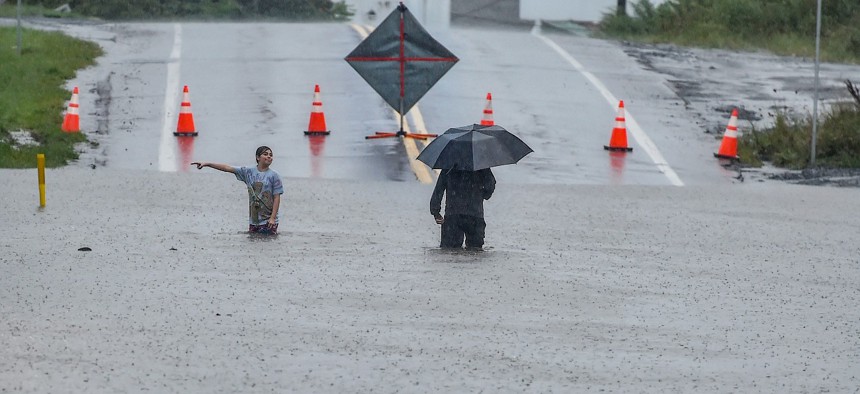
A man and young girl made their way through a flooded main street in Pittston, Pa., in September 2021, as flash flooding due to Hurricane Ida had closed many streets throughout the area. “Children can lose their parents, face food insecurity, and become homeless after floods, hurricanes and other extreme weather catastrophes,” according to Rep. Donald M. Payne Jr., who introduced the bill. Aimee Dilger/SOPA Images/LightRocket via Getty Images
A New Law Ensures Kids’ Needs Are Prioritized In Natural Disasters and Other Catastrophic Events
“Children suffer the most when these tragedies occur in communities,” one lead lawmaker says.
The federal response to natural disasters, terrorism and other catastrophic events will now have to ensure that the needs of children are met.
On Monday, President Biden signed the “Homeland Security for Children Act,” which the House and Senate passed in September and May, respectively. Previous attempts to enact this bill died in earlier sessions of Congress.
“We must make the safety and well-being of children a top priority when we plan for natural and man-made disasters,” said Rep. Donald Payne Jr., D-N.J., who introduced the bill. “Children suffer the most when these tragedies occur in communities. We must have a strategic and comprehensive plan to handle their needs before, during and after any emergency.”
For instance, “hundreds to thousands of children can lose their parents, face food insecurity, and become homeless after floods, hurricanes and other extreme weather catastrophes,” stated a press release from the congressman’s office.
The new law requires the Homeland Security Department secretary to ensure that the heads of each DHS office and component consider children’s needs, including those in under-served communities, in mission planning and execution to respond to natural disasters, terrorism, and other disasters. In order to further this goal, the secretary should require each head to seek input from organizations that advocate for children’s needs.
The law also creates a new “Children's Technical Expert” position within the Federal Emergency Management Agency. No more than one year after the bill’s enactment and then annually thereafter for five years, the DHS secretary must submit a report to Congress on the department’s process to seek feedback from the outside organizations and incorporate their feedback into the department’s policies.
A FEMA spokesperson told Government Executive, “this new law is a helpful reminder of the importance of considering children’s needs in the planning and response to natural disasters, and we look forward to implementing the provisions of the bill.”
Rep. Bennie Thompson, D-Miss., chairman of the House Homeland Security Committee, thanked Payne for taking the lead on this issue and the president for signing the bill into law.
“With disasters – whether natural or man-made - on the rise, we must continue to do more to ensure the well-being and safety of our nation’s most vulnerable, particularly our children,” said Thompson. “When faced with disasters or emergencies, children face a far greater risk of negative outcomes than the rest of us.”
During a previous session of Congress, Save the Children, a humanitarian aid organization, worked with members of Congress on the legislation and advocated for its passage.
This article has been updated with comment from FEMA.







